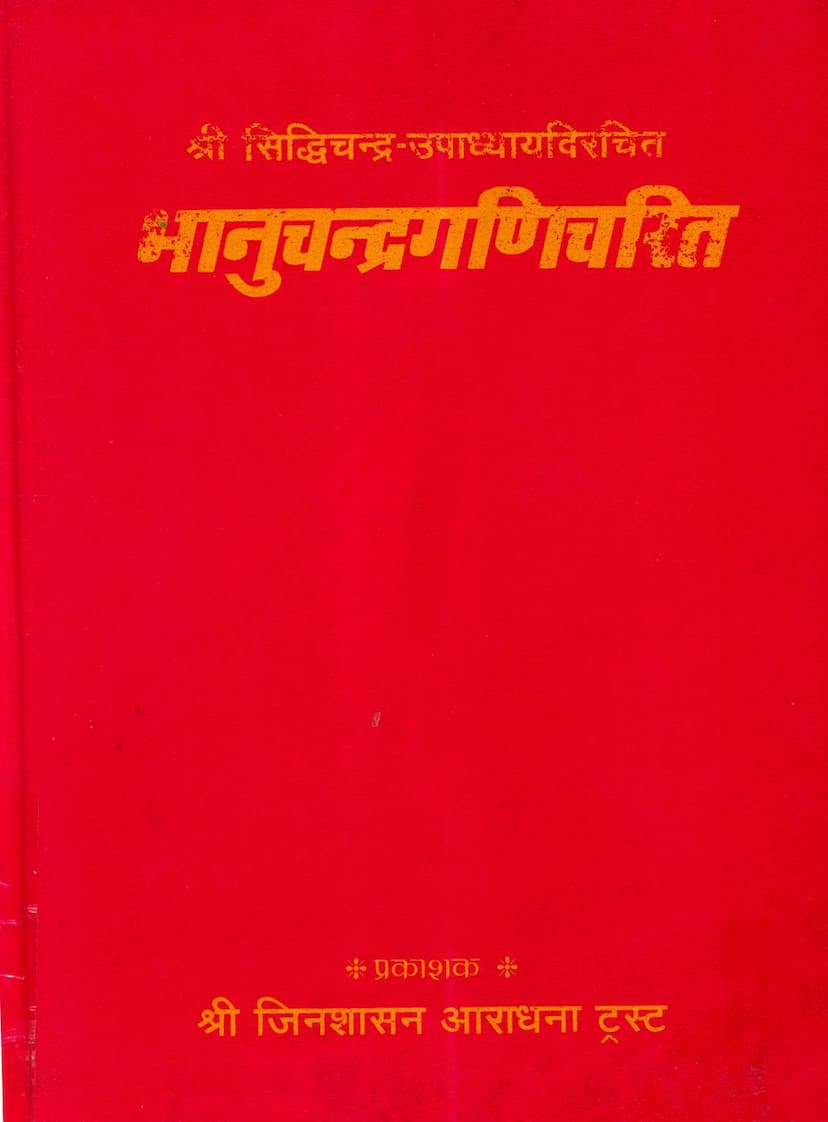Bhanuchandragani Charit
Added to library: September 2, 2025

Summary
Here's a comprehensive summary of the Jain text " Bhanuchandragani Charit" (The Biography of Bhanuchandra Gani) authored by Siddhichandra Upadhyay, based on the provided pages:
Overall Purpose and Context:
The book "Bhanuchandragani Charit" is a biography of Bhanuchandra Gani, a prominent Jain monk who lived during the era of Emperor Akbar. The work was compiled by Siddhichandra Upadhyay, who was a disciple of Bhanuchandra Gani. The text aims to document the life, teachings, and significant interactions of Bhanuchandra Gani, particularly highlighting his influence on Emperor Akbar and the broader religious landscape of India during that period. The text emphasizes the importance of Jain principles like non-violence, compassion, and knowledge in influencing worldly rulers and promoting spiritual well-being.
Key Themes and Content:
-
The Mughal Court and Jain Influence:
- The book extensively details the religious tolerance and intellectual curiosity of Emperor Akbar, who actively sought to understand various faiths.
- It highlights the presence and significant role of Jain scholars and monks at Akbar's court, engaging in philosophical debates and influencing the Emperor's policies.
- Jain teachers like Hira Vijaya Suri, Vijaya Sena Suri, and Bhanuchandra Upadhyaya are presented as key figures who interacted with Akbar.
- Akbar's adoption of certain Jain principles, such as vegetarianism, prohibition of animal slaughter during religious periods, and respect for Jain holy places, is a central theme.
- The text mentions the conferment of titles and honors upon Jain scholars by Akbar, recognizing their intellectual prowess and spiritual depth.
-
The Life of Bhanuchandra Upadhyaya:
- Bhanuchandra is portrayed as a highly learned, virtuous, and influential monk.
- His early life, his initiation into Jainism, and his education under his guru, Surachandra, are briefly touched upon.
- He is described as a prolific writer and commentator on various philosophical and literary works.
- His intellectual capabilities were recognized by Emperor Akbar, who sought his guidance and considered him an intellectual companion.
- Bhanuchandra played a crucial role in advocating for Jainism at the Mughal court, ensuring the construction of Jain temples and the respect of Jain practices.
- The text details his interactions with Emperor Akbar, including teaching him about the names of the Sun and discussing religious principles.
- It also touches upon his activities during Jahangir's reign, where he continued to hold significant respect despite the Emperor's volatile nature.
-
Siddhichandra Upadhyay (The Author):
- Siddhichandra is presented as a talented and devoted disciple of Bhanuchandra.
- He is noted for his sharp intellect, performing feats of memory (avadhānas), and his profound knowledge.
- The book itself is his work, dedicated to his master.
- He also had significant interactions with Emperor Jahangir, demonstrating remarkable fortitude and adherence to Jain principles even when faced with imperial displeasure.
-
Key Incidents and Interactions:
- Hira Vijaya Suri's Influence: The text elaborates on Hira Vijaya Suri's initial visit to Akbar's court, his eloquent explanations of Jainism, and his success in persuading Akbar to prohibit animal slaughter and abolish pilgrim taxes on Mount Shatrunjaya.
- Bhanuchandra's Patronage by Akbar: Bhanuchandra's appointment as a teacher for Akbar's princes and his respected position at court are highlighted. His role in abolishing the pilgrim tax on Mount Shatrunjaya is a significant event.
- Interactions with Jahangir: The book chronicles Bhanuchandra and Siddhichandra's experiences under Emperor Jahangir, including instances of imperial favor and the Emperor's temporary displeasure leading to the banishment of Jain monks, which was later rescinded.
- Debates and Disputation: The text mentions debates where Jain scholars, including Siddhichandra, successfully defended Jain doctrines against critiques from other religious scholars.
- Temple Construction and Protection: The efforts of Jain monks in getting temples built and protected, especially on Mount Shatrunjaya, are emphasized.
-
Jain Philosophy and Practices:
- The text implicitly and explicitly discusses core Jain tenets like Ahimsa (non-violence), compassion towards all living beings, the importance of knowledge (Jnana), and the path to liberation.
- The strict adherence to vows and principles by Jain monks, even in the face of adversity, is a recurring theme.
- The role of austerities (tapas) in Jainism is also mentioned.
-
Literary Style and Structure:
- The book is a biographical narrative written in verse.
- It is divided into four chapters (Prakasas), each focusing on specific periods or events in Bhanuchandra's life and his interactions with the emperors.
- The author, Siddhichandra, expresses humility and acknowledges the difficulty of adequately describing his master's virtues.
- The narrative is enriched with detailed descriptions of cities, historical events, and the cultural milieu of the time.
Publisher and Editorial Information:
- Publisher: Shri Jinashasan Aradhana Trust.
- Editor: Shri Mohanlal Dalichand Desai (B.A., L.L.B., Advocate, High Court, Mumbai), who is also the author of other works on Jain literature.
- The book is a re-publication, aimed at making this rare work available to a wider audience.
In essence, "Bhanuchandragani Charit" serves as a valuable historical and religious text that illuminates the significant presence and impact of Jainism at the height of the Mughal Empire, showcasing the intellectual and spiritual contributions of figures like Bhanuchandra Gani and his disciple Siddhichandra Upadhyay.